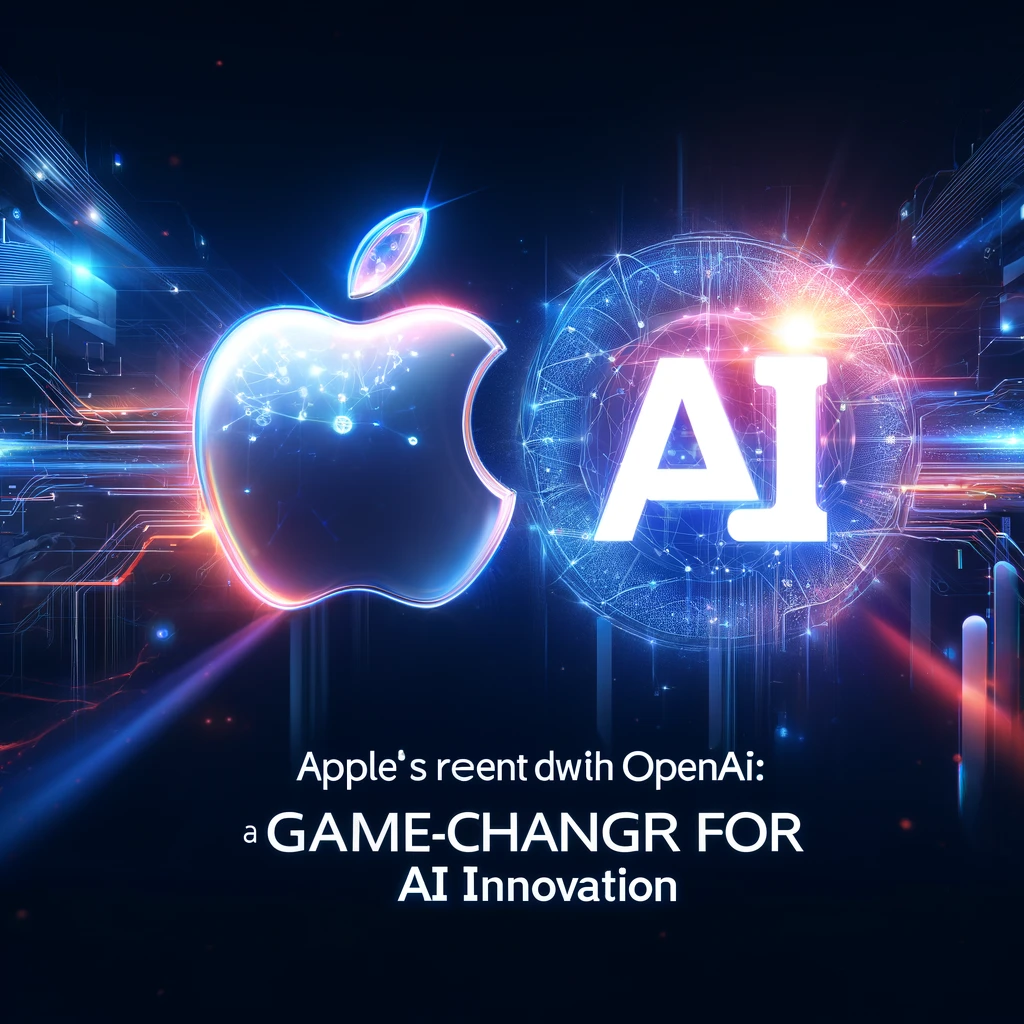
Introduction
Apple’s recent deal with OpenAI marks a significant milestone in the tech industry. This partnership is not just a business transaction; it’s a convergence of two technological powerhouses aiming to push the boundaries of what’s possible with artificial intelligence. By combining Apple’s extensive hardware ecosystem with OpenAI’s innovative AI research, this collaboration promises to deliver unprecedented advancements in AI technology.
Background of Apple and OpenAI
Apple, a global leader in technology, is renowned for its innovative products and ecosystem. From the iPhone to the MacBook, Apple has consistently pushed the envelope in terms of design, functionality, and user experience. OpenAI, on the other hand, has been at the forefront of AI research. Founded with the mission to ensure that artificial general intelligence (AGI) benefits all of humanity, OpenAI has developed some of the most advanced AI models, including the GPT series.
Apple’s History with AI
Apple’s journey with artificial intelligence began years ago, with significant investments in AI and machine learning technologies. Siri, Apple’s virtual assistant, was one of the first major AI applications that brought AI into the hands of millions of consumers. Over the years, Apple has continued to integrate AI into its products, enhancing features like image recognition, natural language processing, and predictive text.
OpenAI’s Contributions to AI
OpenAI has made remarkable contributions to the field of AI. Its development of GPT-3, one of the most advanced language models, has showcased the potential of AI in understanding and generating human-like text. OpenAI’s research spans various domains, including robotics, computer vision, and reinforcement learning, positioning it as a leader in AI innovation.
Details of the Apple-OpenAI Deal
While the specific financial terms of the deal have not been disclosed, the partnership focuses on leveraging OpenAI’s advanced AI models to enhance Apple’s product offerings. This includes integrating OpenAI’s technology into Apple’s hardware and software ecosystem, enabling more intelligent and intuitive user experiences across devices.
Technological Synergies
The synergy between Apple and OpenAI is expected to yield significant technological advancements. Apple’s powerful hardware, including its custom silicon chips, provides an ideal platform for running complex AI models developed by OpenAI. This integration can lead to more efficient processing, reduced latency, and enhanced performance of AI-driven applications.
Impact on AI Research
This partnership is poised to accelerate AI research. By combining resources and expertise, Apple and OpenAI can undertake more ambitious research projects, pushing the boundaries of AI capabilities. This could lead to breakthroughs in areas such as natural language understanding, computer vision, and autonomous systems.
Implications for Developers
For developers, this deal opens up new possibilities. With access to OpenAI’s models and Apple’s hardware, developers can create more sophisticated and powerful applications. Apple’s developer tools, integrated with OpenAI’s technology, will enable the development of AI-driven apps that were previously unimaginable.
Consumer Benefits
Consumers stand to gain immensely from this partnership. The integration of OpenAI’s AI models into Apple’s ecosystem will enhance the functionality and performance of everyday products. From smarter virtual assistants to more intuitive user interfaces, the consumer experience is set to be transformed.
AI in Everyday Apple Products
AI is already a significant component of Apple’s product line, but this partnership promises to take it to the next level. Users can expect more intelligent features in devices such as the iPhone, iPad, and MacBook. For example, AI-driven enhancements in photography, augmented reality, and user personalization will become more prevalent.
Enhanced Siri Capabilities
One of the most anticipated outcomes of the deal is the enhancement of Siri. By incorporating OpenAI’s language models, Siri could become more conversational, accurate, and useful. This would address longstanding criticisms and potentially position Siri as the leading virtual assistant in the market.
Improved Security and Privacy
Apple’s commitment to user privacy is well-known. Integrating OpenAI’s technology will adhere to this principle, ensuring that AI advancements do not come at the cost of user data security. Apple’s on-device processing capabilities will allow for sophisticated AI features without compromising privacy.
Integration with iOS Ecosystem
The iOS ecosystem will greatly benefit from this collaboration. AI-driven features will be more seamlessly integrated across Apple’s suite of products, providing a more cohesive and interconnected user experience. This integration will make devices smarter, more responsive, and more capable of anticipating user needs.
Advancements in Machine Learning
Machine learning is a critical component of AI, and this partnership will likely lead to significant advancements in this area. By combining Apple’s hardware expertise with OpenAI’s machine learning models, we can expect more efficient and powerful AI applications that can learn and adapt over time.
Potential Challenges and Concerns
Despite the potential benefits, there are challenges and concerns to address. The integration of advanced AI into consumer products raises questions about job displacement, ethical AI use, and the potential for misuse. Both companies will need to navigate these issues carefully to ensure positive outcomes.
Regulatory and Ethical Considerations
The deployment of AI at this scale requires adherence to regulatory standards and ethical guidelines. Apple and OpenAI must work with regulatory bodies to ensure their AI technologies are used responsibly. This includes addressing concerns around bias, fairness, and transparency in AI systems.
Global Market Impact
The global market is likely to feel the impact of this partnership. As Apple integrates advanced AI into its products, competitors will need to respond, potentially leading to a surge in AI development across the tech industry. This could drive innovation and lead to new AI applications and solutions worldwide.
Future Innovations and Collaborations
This deal could be the beginning of more extensive collaborations between Apple and OpenAI. Future innovations could include AI-driven health technologies, advanced autonomous systems, and new forms of human-computer interaction. The possibilities are vast and exciting.
Case Studies of AI in Action
To illustrate the impact of AI, consider case studies where AI has already made significant contributions. For instance, in healthcare, AI has been used to predict patient outcomes and assist in diagnostics. In finance, AI models help detect fraudulent transactions and optimize investment strategies.
Apple’s AI Vision for the Future
Apple envisions a future where AI is seamlessly integrated into every aspect of its products and services. This vision includes making devices smarter, more intuitive, and more helpful, enhancing the overall user experience and making technology more accessible to everyone.
Expert Opinions
Experts in the field have weighed in on this partnership, highlighting its potential to drive innovation and set new standards in AI technology. Many believe that combining Apple’s hardware with OpenAI’s software expertise could lead to groundbreaking advancements that will shape the future of technology.
FAQs
What is the focus of the Apple-OpenAI partnership?
The focus is on integrating OpenAI’s advanced AI models with Apple’s hardware and software to enhance the functionality and performance of Apple’s products.
How will this deal benefit consumers?
Consumers will benefit from smarter, more intuitive devices with enhanced AI-driven features, improved user experiences, and greater security and privacy.
What impact will this have on developers?
Developers will have access to powerful AI tools and technologies, enabling them to create more sophisticated and innovative applications.
Are there any concerns regarding this partnership?
Potential concerns include job displacement, ethical AI use, and ensuring that AI technologies are used responsibly and fairly.
What advancements can we expect from this collaboration?
We can expect significant advancements in AI research, including improvements in natural language understanding, computer vision, and machine learning.
How will this affect the global market?
The partnership is likely to drive AI innovation across the tech industry, leading to new applications and solutions and influencing global market dynamics.
Conclusion
Apple’s recent deal with OpenAI is a landmark moment in the tech industry, promising to drive significant advancements in artificial intelligence. This partnership is set to enhance consumer products, empower developers, and accelerate AI research. As Apple and OpenAI collaborate, we can look forward to a future where AI is more integrated into our daily lives, making technology smarter, more intuitive, and more beneficial for everyone.





